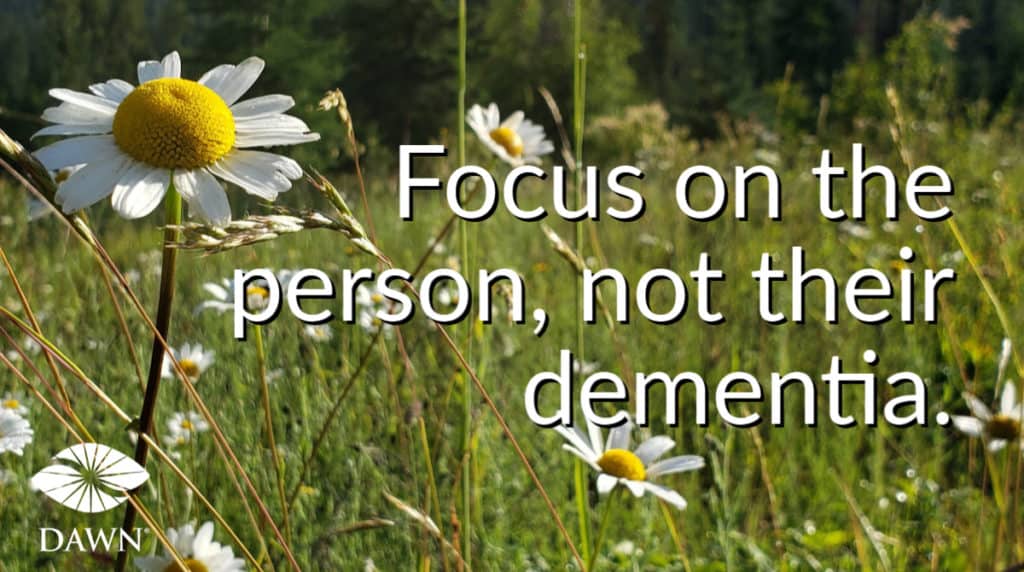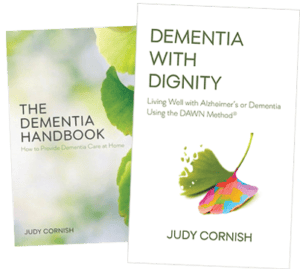This is ME Talking — Not My Dementia!
We know that language skills are eventually lost in dementia. But do we really understand what dementia and language loss mean? Let’s be careful that we understand that ability is lost but the desire and need to communicate remains. Here at DAWN, we are person-directed in our approach, which means the way we provide care is shaped by each client’s individual needs and desires.
When our clients speak, we assume that they are trying to tell us something. We also assume that the accuracy of what they express will depend upon the degree to which their language skills have already been impacted by dementia. Some people lose language very early; others retain the ability to express themselves accurately far longer.
Look for the meaning in what they are saying
When our clients speak to us, they are attempting to connect and share something with us, or they are expressing a need or desire. Sometimes what they say doesn’t seem to make sense, but we strive to understand what they are trying to get across.
“No” may mean “I don’t understand and I need more information”
We worked with one family in which the wife was the caregiver spouse and the husband was the spouse with dementia. His vocabulary had begun to disappear years earlier. His use of language was becoming quite limited. We quickly learned that when we asked if he needed to use the bathroom and he said “No” or “I can’t,” that what he actually meant was: “I don’t know what the word “bathroom” means; please give me more information.” If we then asked him to come down the hall with us, and he looked into the bathroom and saw the toilet, very often he realized that he needed to use it.
At other times, he would balk at going into a room and say “No.” What he wanted, however, was not to avoid going into the room, but to have someone explain to him what the room was and who was in it. He simply didn’t have the language skills to ask he wanted to know.

His family, however, did not accept his truncated, overly simplified and inaccurate statements as attempts to communicate. Instead, they ignored his statements and said, “See, he has dementia. That’s his dementia talking.”
It was not his dementia talking. It was always him. Let’s be careful that, in our recognition and acceptance that our loved ones’ and clients’ ability to use language is fading, we don’t ignore their attempts to communicate. Look for meaning in what your loved one is saying. The way people with dementia use language will be both creative and original. We have the greater language skills. The onus is on us to use our skills to understand them.
Empathize with their emotions and restore a sense of security
One of my clients had to be taken for a medical procedure in a town several hours away. The weather was bad, long stretches of the road were under construction, the medical procedure was painful, and the clinic was crowded and noisy. My client faced one situation after another and endured a great deal of strange and unpleasant stimuli. She was exhausted and deeply confused long before we left the clinic. She turned to me and said, with tears in her eyes, “I feel like I’m floating.”
I didn’t say to myself, “That’s the dementia talking,” and ignore her statement. I agreed with her and expressed for her what she couldn’t put into words—that so many confusing things had happened how could she possibly make sense of it, but that soon we would get into the car and head for home. That was what she needed to hear. My response validated her feelings and restored her sense of security.
Remember that your loved one still wants to communicate with you and deserves to be taken seriously. We are the ones with intact cognitive skills. We should use our rational thought and language skills to decipher theirs.
§
Sign up for our newsletter and free video series
Sign up for our monthly newsletter and get more advice on how to help someone experiencing dementia. As a bonus, you’ll get our free video series, “Preparing for Dementia.”



